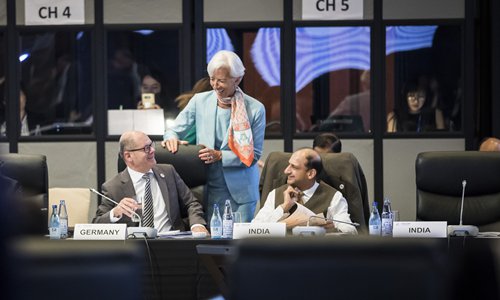Amid an impasse between the US and China, the G20 summit in Japan offers a platform where US President Donald Trump will be able to talk with Chinese President Xi Jinping, if all goes well. It is too early to predict the outcome, but the summit has rekindled hopes that the two sides may resume trade talks after negotiations to reach a broad deal left hanging last month.
Some have criticized the G20's ineffectiveness in recent years, but this year's summit is making people realize the significance of the bloc. If the G20 wants to continue to build its influence and credibility, it needs to play an active role in promoting good economic governance to deal with crises. At the very least, it must keep the bottom line. Bowing to trade protectionism will only undermine international economic governance.
The pressure of protectionism has cast a shadow over not only China but also Germany, France, South Korea, India and many other countries and regions. The world is worried that major economies are digging in for a protracted and costly trade war that weighs on financial markets. Such concerns should be reflected through the G20 platform.
The world economy is too fragile to bear the risk of a new crisis caused by the trade war. This year's summit should send a clear signal: trade protectionism is intolerable.
In 2008, G20 national leaders met for the first time in Washington to discuss a response to the global financial crisis that battered the US economy. Today, along with the rise of protectionism, the US may seek to make the bloc once again subservient to its purposes and silent on trade protectionism.
But the situation has changed a lot. G20 members shared common ground on fighting the global financial crisis in 2008, but now trade protectionism goes against the interests of most G20 members. The group cannot become a tool wielded for the benefit of the US.
A communiqué issued earlier this month by G20 finance leaders excluded a proposed clause that would have recognized "the pressing need to resolve trade tensions." The change, contained in a previous draft, was deleted at the insistence of the US, according to Reuters. The deletion suggests the US might adhere to the spirit of a trade war.
China opposes trade protectionism and supports free trade, stances that it has in common with most G20 members. Fighting protectionism should be at the top of the agenda of this year's G20 summit as the rising threat of protectionism and vulnerabilities in global capital markets cast a shadow over the world economy.
The author is a reporter with the Global Times. bizopinion@globaltimes.com.cn
Some have criticized the G20's ineffectiveness in recent years, but this year's summit is making people realize the significance of the bloc. If the G20 wants to continue to build its influence and credibility, it needs to play an active role in promoting good economic governance to deal with crises. At the very least, it must keep the bottom line. Bowing to trade protectionism will only undermine international economic governance.
The pressure of protectionism has cast a shadow over not only China but also Germany, France, South Korea, India and many other countries and regions. The world is worried that major economies are digging in for a protracted and costly trade war that weighs on financial markets. Such concerns should be reflected through the G20 platform.
The world economy is too fragile to bear the risk of a new crisis caused by the trade war. This year's summit should send a clear signal: trade protectionism is intolerable.
In 2008, G20 national leaders met for the first time in Washington to discuss a response to the global financial crisis that battered the US economy. Today, along with the rise of protectionism, the US may seek to make the bloc once again subservient to its purposes and silent on trade protectionism.
But the situation has changed a lot. G20 members shared common ground on fighting the global financial crisis in 2008, but now trade protectionism goes against the interests of most G20 members. The group cannot become a tool wielded for the benefit of the US.
A communiqué issued earlier this month by G20 finance leaders excluded a proposed clause that would have recognized "the pressing need to resolve trade tensions." The change, contained in a previous draft, was deleted at the insistence of the US, according to Reuters. The deletion suggests the US might adhere to the spirit of a trade war.
China opposes trade protectionism and supports free trade, stances that it has in common with most G20 members. Fighting protectionism should be at the top of the agenda of this year's G20 summit as the rising threat of protectionism and vulnerabilities in global capital markets cast a shadow over the world economy.
The author is a reporter with the Global Times. bizopinion@globaltimes.com.cn



